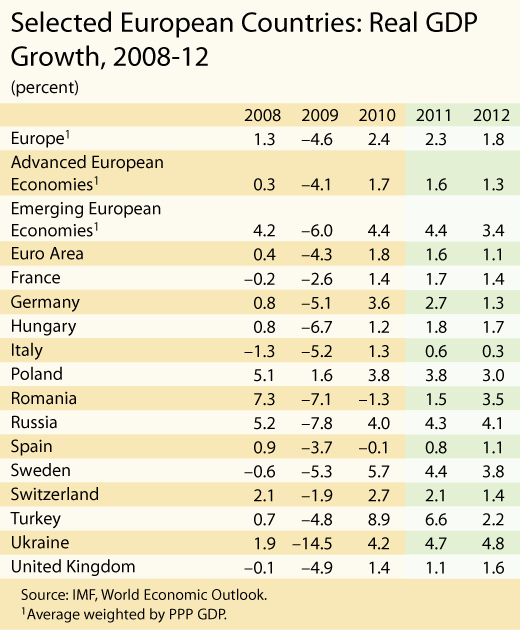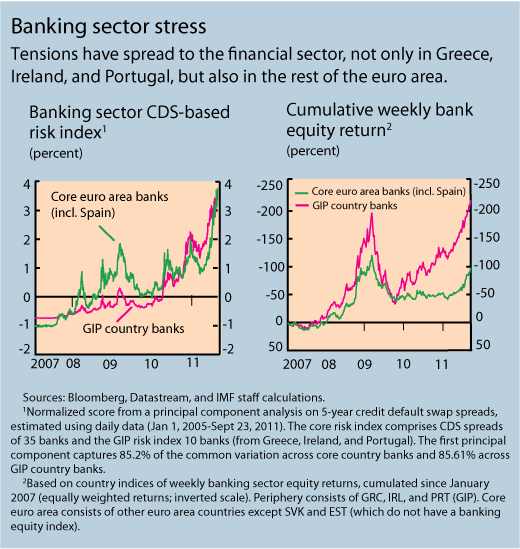
Typical street scene in Santa Ana, El Salvador. (Photo: iStock)
IMF Survey: Collective Efforts Needed To Restore Growth in Europe
October 6, 2011
- Growth undermined by the euro area sovereign debt crisis
- Collective efforts, including strong implementation of agreed measures needed to restore confidence
- Emerging Europe facing a tougher external environment
The economic outlook for Europe has deteriorated substantially, as a result of global shocks and the escalation of the euro area sovereign debt crisis.

Headquarters of the European Central Bank in Frankfurt. Waning growth momentum and rising financial tensions call for determined action by euro area policymakers (photo: Thomas Lohnes/Newscom)
REGIONAL ECONOMIC OUTLOOK: EUROPE
The IMF now projects that growth for all of Europe will slow from 2.3 percent in 2011 to 1.8 percent in 2012, as outlined in the October 2011 Regional Economic Outlook for Europe (see table). The projections are predicated on the assumption that strong action is taken to contain the current crisis, but downside risks remain substantial.
After a strong start in 2011, a barrage of negative shocks slowed the global economy toward mid-year and exposed underlying economic fragilities. In this context, Europe had to cope with surprisingly soft economic activity in the United States, high commodity prices, and disrupted global supply chains from Japan’s earthquake and tsunami.
But Europe also contributed to the slowdown with home-grown difficulties from escalating tensions in the euro area’s sovereign debt and financial markets. Sovereign spreads widened sharply in the program countries Greece, Ireland, and Portugal, and tensions spread to Italy and Spain and more broadly through the entire financial system (see chart). While emerging Europe continues to do relatively well, it too could be affected, given its close financial and economic links with the west.
Waning growth momentum and rising financial tensions call for determined policy action. Most urgently, a consistent, cohesive, and cooperative approach to monetary union needs to be adopted by all euro area stakeholders to secure a durable solution to the euro area crisis.
“While many important steps have been taken by the European leaders, it is now necessary to deploy quickly the new crisis management tools agreed upon at the July 21 European Summit and come together around a cooperative plan to deal with the various components of the current crisis. This is much needed to restore the confidence of consumers, markets, and investors,” Antonio Borges, Director of the IMF’s European Department, said.

Reversing the slide in advanced Europe
Growth in advanced Europe is projected to decline. Developments will continue to be subdued in countries under market pressure, which forces strong austerity and sharp private-sector balance sheet deleveraging.
Growth in the United Kingdom will remain hampered by weak income prospects before rebalancing in 2012. Countries free from market pressure, such as Germany and Sweden, are better off, but nonetheless face strong headwinds from the global slowdown and necessary repair of public finances. Banks’ funding pressures are also denting confidence, with negative consequences for private domestic demand. Output gaps will close more slowly than previously expected and inflationary pressures will recede.
The softer outlook calls for an adjustment of the macroeconomic policy mix. In particular, as downward risks persist, monetary policy has currently scope for a reduction in policy rates.

On the fiscal front, countries with credible medium-term fiscal consolidation plans or front-loaded fiscal adjustment should allow full play of automatic stabilizers; countries with historically low funding costs should also consider delaying some of their fiscal adjustment if activity undershoots current expectations. In contrast, countries under market pressure have no choice but to stick to their adjustment plans.
Policymakers are well aware that dealing with the euro area crisis is now the first priority. Despite the important commitments that have been made, concrete steps must now be undertaken on three fronts to secure success.
•Putting the financial sector on a sounder footing. Capital buffers remain thin in many banks, despite the welcome increases already undertaken and planned in the context of the latest pan-European stress tests. There is a risk that low confidence in banks would continue to undermine their access to funding, risking a credit crunch with pernicious feedbacks to economic and financial performance. In that context, ambitious actions to restore the ability of the banking sector to finance the economy are urgently needed, including measures to bring additional capital to European banks, if necessary using EFSF resources, as well as longer term liquidity facilities from the European Central Bank.
•Formulating and committing to a common vision about the future functioning of the euro area. Important headway in addressing the shortcomings exposed by the crisis has been made. Most recently, at their July 21 summit, EU leaders decided to increase the remit of the EFSF. To anchor expectations and dispel the prevailing uncertainties, it is now necessary to deploy quickly the new crisis management tools agreed upon at the summit and come together around a clear vision of the future shape of the monetary union. Stronger fiscal risk sharing―before crises occur―and a common approach and backstop of the financial system should be key elements. They would need to be flanked by strengthened fiscal and economic governance. The governance “six-pack” is welcome progress, but much more needs to be done to support a clear and common vision on economic policy and burden sharing in the euro area.
•Steadfastly implementing adjustment programs at national levels. Bolstering fiscal sustainability and enhancing growth prospects through structural reforms remain paramount to restoring confidence and stability.
Reducing vulnerabilities in emerging Europe
Emerging Europe is now caught up in the downturn of advanced countries. Economic performance held up well in the first half of 2011, especially in the largest economies of the region, Poland, Russia, and Turkey. Encouragingly, growth picked up impressively in the Baltics and, to a lesser extent, in Southeastern Europe, all countries where the 2008/09 crisis had hit hard.
Nonetheless, by mid-year unmistakable signs of a generalized slowdown emerged in the wake of the softening of the economies in advanced Europe and globally. Growth is now projected to decline to 3.4 percent in 2012, after 4.4 percent in both 2011 and 2010. Again, failure to arrest the euro area crisis poses a major downside risk with the potential of sending growth sharply lower.
In this volatile environment, policymakers must do what they can to avoid coming under market pressure, to shore up their defenses, and to mobilize domestic engines of growth. Vulnerabilities from the 2008/09 crisis need to be addressed, such as eroded fiscal buffers and high levels of non-performing loans (NPLs) in the banking systems.
Introducing fiscal rules would help reassure markets and investors about medium-term fiscal prospects, especially when designed to keep a lid on expenditure also in good times. Faster resolution of NPLs would improve bank lending, strengthen the recovery, and help allocate resources to sectors with the most promising growth prospects.


